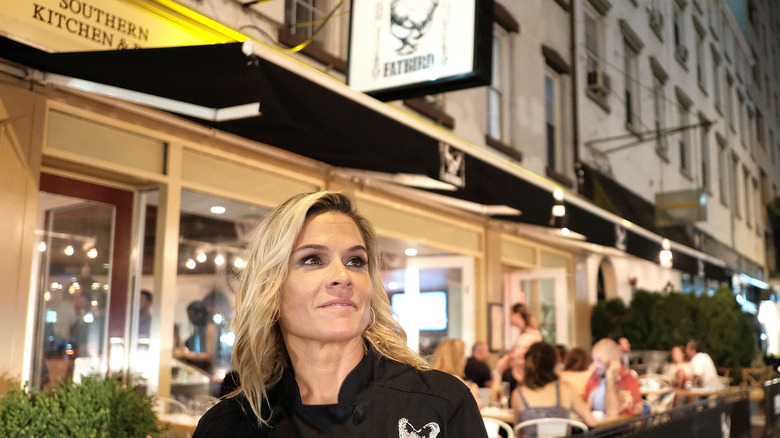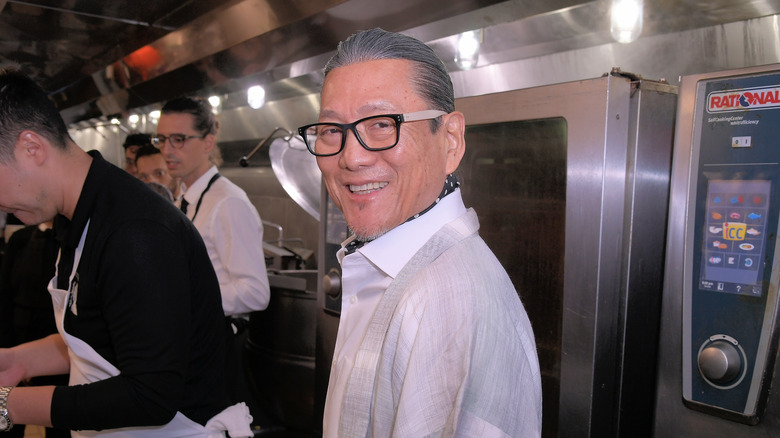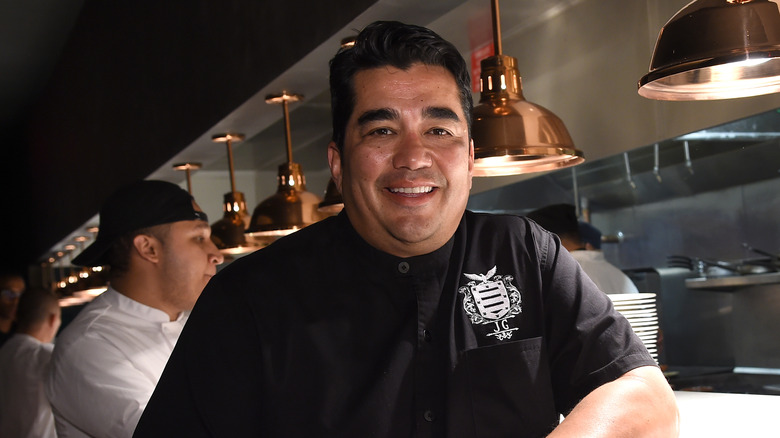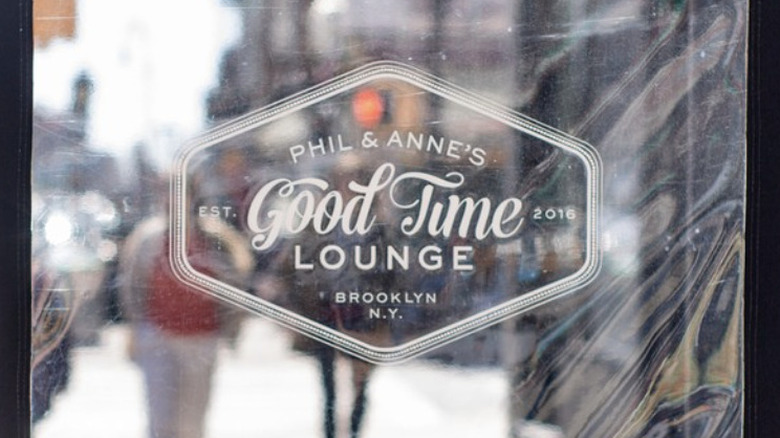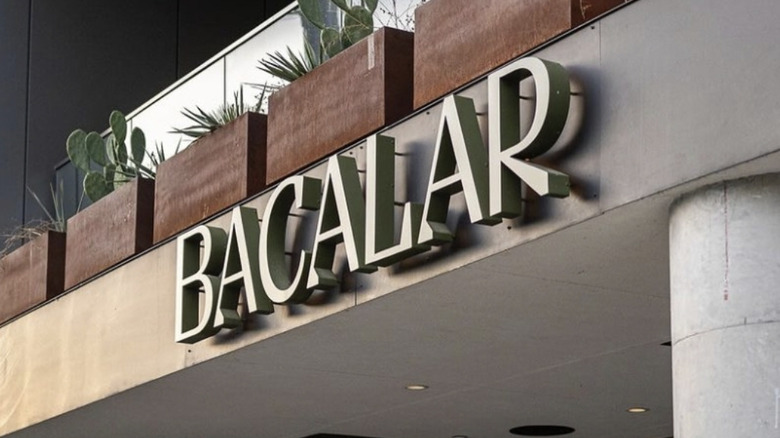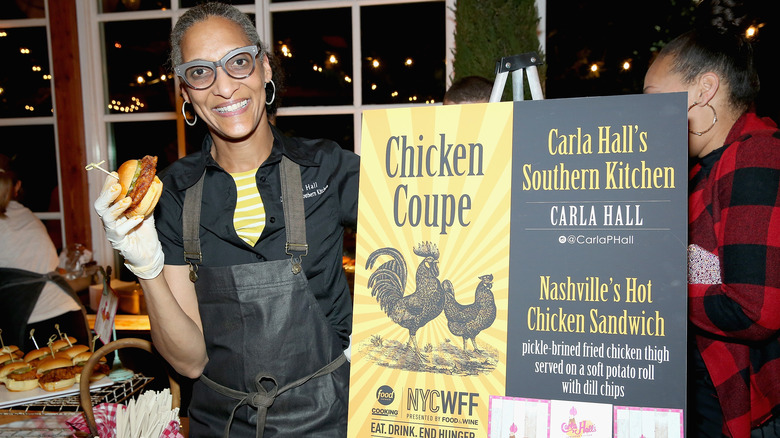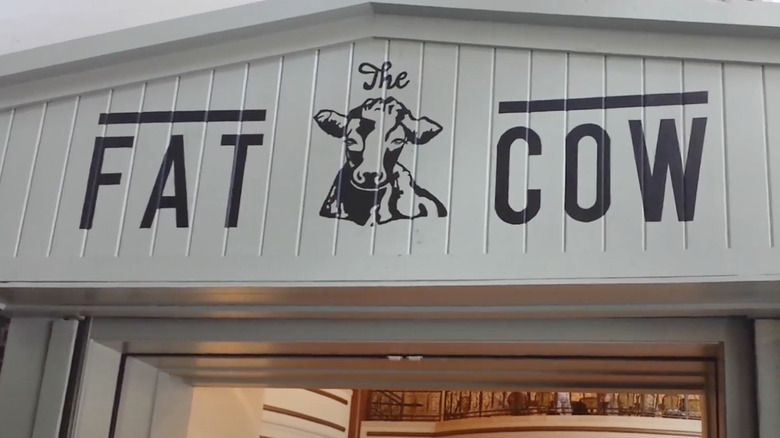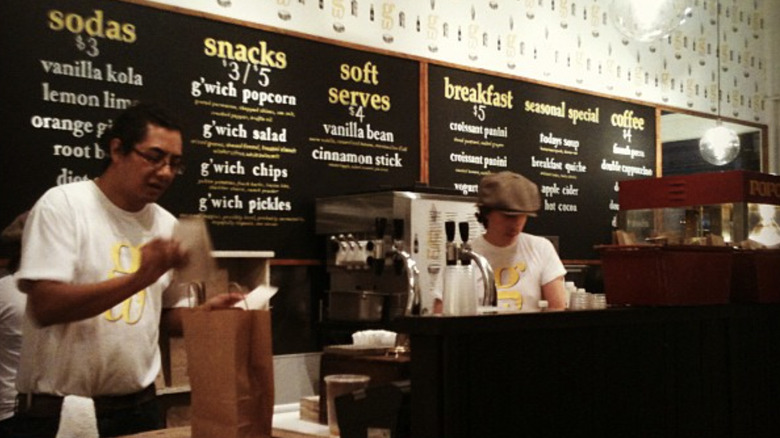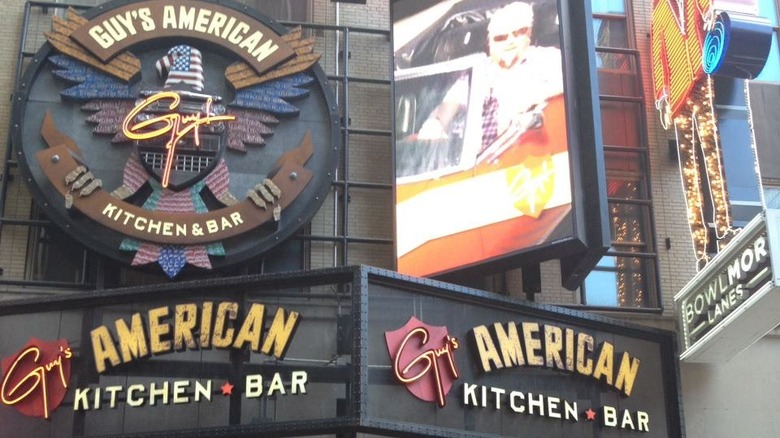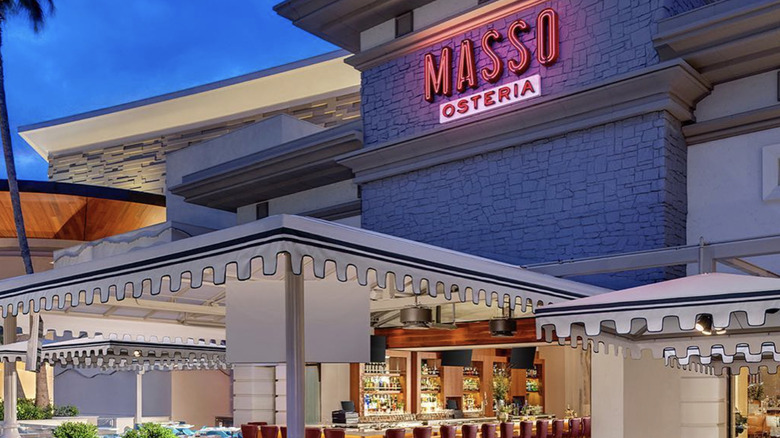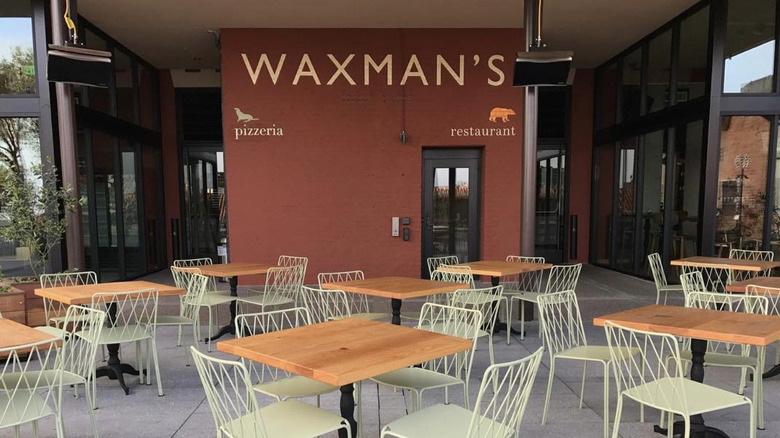Celebrity Chef Restaurants That Were Massive Flops
We may receive a commission on purchases made from links.
The whole point of being a celebrity chef — whether it's by exceptionally working through the ranks at already notable restaurants run by others ,or making a name for oneself with appearances on Food Network, daytime T.V., or "Top Chef" — is to open a restaurant all one's own. It's something a chef's professional life builds to, a statement and encapsulation of everything they believe about food, and their attempt to make a mark on the culinary culture. And from a business point of view, a restaurant bearing the name or imprint of a celebrity chef seems like a fail-proof idea. Out of all the restaurants from which diners can choose, celebrity chef eateries have a built-in selling point and potentially huge audience.
But for a number of reasons — economics, personal drama, politics, or legal entanglements — occasionally a famous chef's big restaurant can't sustain the hype, build a clientele, or stay open longer than a few years or even a few months. Here are all the biggest restaurants that spectacularly and inexplicably failed, despite being devised by some of the world's best and best known celebrity chefs.
Cat Cora's FatBird
One of the best chefs you can book on Cameo right now, Cat Cora is quite well-known for her food television accomplishments — she's the first woman to win "Iron Chef America" and co-hosted "Around the World in 80 Plates" and "My Kitchen Rules." The chef's name is most associated by the public with restaurants. The chef helped open 15 restaurants, and most have enjoyed consistent success, such as Postino in San Francisco, and Kouzzina at Walt Disney World, as well as hundreds of Olilo and Wicked Eats pop-ups and numerous Cat Cora's Kitchen locations in American airports. Cora's least successful dining concept was a Southern restaurant called Firebird. Launching in the Meatpacking District in New York City in June 2016, Firebird's menu consisted of favorites like baby back ribs, spicy chicken, and Jell-O shots.
Across its brief lifespan, Firebird faced constant problems. Four months after the restaurant debuted, Cora sued business partner Charissa Davidovici for allegedly reneging on agreement to pay the chef a $400,000 fee to license her name and recipes. Critics weren't kind to Firebird and found many of the food items unsavory. The restaurant went dark after just seven months.
Masaharu Morimoto's Tribeca Canvas
Due to his exemplary competition record, Masaharu Morimoto is regarded by many as the quintessential "Iron Chef" on the globally popular cooking battle show of the same name. Of the 26 contests in which he competed, Morimoto came up victorious 17 times over both the original Japanese "Iron Chef" in the 1990s and "Iron Chef America" in the 2000s. Off-screen, Morimoto is a wildly successful restaurateur. Receiving fame and acclaim as the executive chef at Nobu, home of a legendary miso black cod, he went on to offer beautifully crafted high-end Japanese cuisine, Pan-Asian fare, and sushi at his Morimoto, Momosan, Sa'Moto, and Wasabi locales around the world.
Morimoto tried something a bit out of character with Tribeca Canvas, a New York restaurant he opened in 2012 to serve American-style, Asian-accented pub food like shrimp nachos, chicken pot pie, and pork ribs. It only made it nine months before Morimoto had to close it down for a reboot. In August 2013, the chef shuttered Tribeca Canvas, moved out his old business partners in favor of new ones, and renamed the place just Canvas. After an extensive interior redesign and a menu more focused on Morimoto's wheelhouse of Japanese classics and sashimi, the renamed once more Bisutoro made it just a few months before it closed for good in January 2014.
Jose Garces' Amada
Prior to adding to the history, evolution, and future of "Iron Chef" and winning Food Network's "The Next Iron Chef" in 2009, Chef Jose Garces opened a series of restaurants under various names across the U.S., notably the first iteration of tapas place Amada in Philadelphia in 2005. Garces expanded the Amada brand with a second tapas restaurant located in Manhattan's Battery Park City. In March 2018, the restaurant closed down without warning or much reason after less than two years. "This business is not an easy one and we have certainly learned from this venture," Garces said in a statement to Eater.
The closure came on the heels of a lawsuit filed against Garces in Pennsylvania, alleging that he owed $280,000 to vendors for his restaurants in that state. The New York Amada, which cost more than $1.3 million to build than initially estimated, also suffered under the financial stress brought by the closure of some of the chef's other restaurants. In 2014, Atlantic City casino complex Revel shut down, forcing the closure of four popular restaurants that Garces operated there.
Anne Burrell's Phil and Anne's Good Time Lounge
After serving under Lidia Bastianich at the high-profile New York restaurant Felidia, Anne Burrell was hired as a chef at the also prominent Savoy, Lumi, and Centro Vinoteca before moving on to host high-energy cooking and reality shows on the Food Network. In addition to "Secrets of a Restaurant Chef," "Chef Wanted," and the ongoing "Worst Cooks in America," Burrell delved back into the New York restaurant scene in 2017, teaming up with her friend, bar owner Phil Casaceli, to create the small Brooklyn spot Phil and Anne's Good Time Lounge. While a burger and tater tots became a signature dish, the restaurant was built on the premise of serving shareable plates of Mediterranean and Italian dishes in a brash, colorful environment where the walls were papered in brightly-colored illustrations of old cars and guitars.
Just under a year after it opened, Phil and Anne's Good Time Lounge closed without advance notice. An often bustling Cobble Hill neighborhood hotspot, the two professionals with their name on the business couldn't get along. "Unfortunately, she and Phil have had differences of opinion during their business relationship that made running a restaurant together impossible," Burrell's representative told Page Six.
Gabe Erales' Bacalar
The lasting legacy of "Top Chef" is so strong that contestants who win generally are vaulted into the upper echelon of American chefs. But almost immediately after he won "Top Chef" Season 18, Gabe Erales's reputation was tarnished by a workplace scandal and career downturns. Following the broadcast of the "Top Chef" season finale in July 2021, the news emerged that in December 2020, Erales lost his job as executive chef at the acclaimed Austin restaurant Comedor because he'd engaged in a relationship with a coworker, cut her hours, then harassed her.
Erales laid low professionally after leaving Comedor in disgrace, and finally opened Bacalar, his first new post-"Top Chef" restaurant, in September 2023. Working with the restaurant company Urbanspace Hospitality, Erales served as executive chef and devised the Bacalar menu, creating dishes based on his childhood food memories of Mexico's Yucatan Peninsula. Ten months later, Bacalar announced on social media channels that it would be closing down to make some alterations. Instead, the restaurant closed down entirely in July 2024, with Urbanspace Hospitality deciding to move its previously takeout-only taco shop Tomalo into the Bacalar space. Erales isn't involved in the new venture in any capacity.
Carla Hall's Southern Kitchen
A "Top Chef" fan favorite from 2008 on, Carla Hall published multiple cookbooks (and the children's book "Carla and the Christmas Cornbread"), co-hosted "The Chew," and in 2016, opened her first restaurant. The Nashville-raised Hall positioned herself as an expert on Southern comfort food, and Carla Hall's Southern Kitchen sold fried chicken, collard greens, cornbread, and banana pudding at reasonable prices. A string of bad choices and just plain rotten luck doomed the Brooklyn startup. "It took us two and a half years until we opened our doors, and then we were only open for a year," Hall said at a 2017 restaurant conference (via Eater).
Two months into its existence, Carla Hall's Southern Kitchen temporarily shut down after an electrical fire, a very tragic thing in her life, and then the restaurant's reputation was damaged by two separate walk-in refrigeration unit failures. "People just didn't trust us to come there. We were letting them down and they were already making an effort to come to us," Hall said (via NRN). The restaurant was also situated in a hard-to-get-to Brooklyn neighborhood and controversially received some of its initial funding from the internet. "It's an understatement to tell you that I got beat up by the social media community for using Kickstarter," Hall said. The chef couldn't even promote the restaurant to millions of potential customers — Hall's gig at "The Chew" didn't allow her to talk about her establishment on T.V. or on her social media pages.
Gordon Ramsay's Fat Cow
Beyond just screaming and swearing at cooks on U.K. and U.S. editions of "Hell's Kitchen" and "MasterChef," mega-famous celebrity chef Gordon Ramsay has hosted lots of other shows, commercially endorsed foods and cooking utensils, and amassed eight coveted Michelin stars altogether for his network of restaurants. He now operates 88 eateries, including 32 in the United States — but it could've been 33. In November 2012, Ramsay's The Fat Cow opened in Los Angeles, serving a menu of rustic and homestyle dishes — lobster mac and cheese, shepherds' pie, wood-fired pizza — made with ingredients procured from an adjoining farmer's market. Just 15 months later, The Fat Cow announced that it would imminently close.
A restaurant in Miami called Las Vacas Gordas — which translates to "The Fat Cow" — threatened legal action, citing trademark infringement. Ramsay aimed to re-brand the restaurant as GR Roast, which earned a $10 million lawsuit from the chef's business partner, Rowen Seibel, who claimed Ramsay purposely bungled the name issue so that he could start up GR Roast — without Seibel. While the restaurant closed, Ramsay and partners were still on the hook for rent payments on the space, and after multiple $52,000 payments weren't made, the owners filed a $6 million lawsuit. While it was still operational, Fat Cow endured two other legal issues, sued in April 2013 by a restaurant supplier to recover the $45,350 owed on an appliances bill, and again in June 2013 by employees who alleged that Ramsay paid below minimum wage and didn't provide legally mandated break periods.
Graham Elliot's Grahamwich
In 2004, 27-year-old Chicago chef Graham Elliot was named a "Best New Chef" by "Food and Wine," and four years later, his eponymous restaurant earned two Michelin stars. He got a lot more famous by embracing popular culture, serving as the resident chef for the Lollapalooza festival in Chicago and appearing as a judge on more than 100 episodes of "MasterChef."
In 2011, about a year into his run on "MasterChef," Elliot opened Grahamwich in Chicago, a restaurant devoted to upscale, complicated, chef-style takes on familiar sandwiches. Critics were unimpressed by Elliot's urge to make savory sandwiches sweet — the banh mi got roasted pineapple, a smoked fish sandwich was dressed with a raisin chutney, and a turkey sandwich got some candied yams, all made on bad foundations. "The bread on each was uniformly spent — either cold or rapidly losing vitality," said the Chicago Reader.
After two and a half years of decreasing business linked to bad reviews, Grahamwich permanently and abruptly shut down in August 2013. Elliot's stated plans to turn the restaurant into a big chain or brand food trucks never came to fruition, either.
Guy Fieri's American Kitchen and Bar
While "Diners, Drive-Ins, and Dives" host Guy Fieri run restaurants both before after he became a famous T.V. chef, Guy Fieri's American Kitchen and Bar represented a big cultural moment for the Food Network star. The man with the loud shirts who made big, messy dishes with bold flavors opened the restaurant in New York City's Times Square in late 2012, serving dishes reflective of the Fieri brand like Awesome Pretzel Chicken Tenders, Guy's Famous Big Bite Caesar, and hamburgers slathered in Donkey Sauce.
Detractors savaged the restaurant. "I'm fascinated by the Guy Fieri terror-dome they just opened up. 600 seats, something like that?" Anthony Bourdain noted on "Opie and Anthony" (via Eater). "The french fries are like $12?" The New York Times reviewer Pete Wells gave Fieri's place a 0-star critique. "Did panic grip your soul as you stared into the whirling hypno wheel of the menu, where adjectives and nouns spin in a crazy vortex?" Wells rhetorically asked Fieri. "Did you notice that the menu was an unreliable predictor of what actually came to the table?"
One of the most tragic things about Guy Fieri's life: His American Kitchen and Bar curiously shut down suddenly in December 2017, weathering criticism but eking out a five-year existence. "Guy's American in New York City served millions of happy guests from all over the world," Fieri told CBS News. "I'd like to say thank you to all of the team members and guests who helped make it all happen."
Scott Conant's multiple establishments
A stalwart judge on "Beat Bobby Flay" and a near-constant presence on "Chopped," among his dozens of Food Network appearances, New York-based chef Scott Conant also runs a small empire of restaurants. Or at least he did until most of them shut down within a catastrophic two-year period.
Just after Impero Caffee arrived in 2016 and shortly thereafter closed, Conant's Flatiron neighborhood Italian restaurant Fusco opened in the spring of 2017, which he named after his grandmother, serving very traditional dishes like tomato basil spaghetti. The 50-seat spot didn't operate for long, shutting down in August 2018. Conant's Los Angeles restaurant The Ponte made it about two years and then served one last round of customers on New Year's Eve 2018 before declining to open back up in the days ahead. As 2019 wore on, Conant also closed his Italian restaurant in Las Vegas, Masso Osteria. As of 2024, the chef and restaurateur boasts just two restaurants in his portfolio: Cellaio Steak in New York and The Americano in Atlanta.
Jonathan Waxman's Waxman's and JBird
Alongside Alice Waters, with whom he worked at Chez Panisse, Jonathan Waxman defined and popularized California cuisine in the 1970s and 1980s. While popping up to lend his expertise on food television shows like "Top Chef Masters" and "MasterChef," he authored "A Great American Cook" and ran a series of well-received restaurants on the East Coast, but made a splashy return to California in March 2016 with the debut of Waxman's. Setting up in San Francisco's historic Ghirardelli Square, Waxman's served a limited, curated dinner menu featuring fresh produce, locally caught seafood, inventive pizza, and the chef's signature dish of roast chicken with salsa verde.
A little more than a year later, In 2017, Waxman's took a hiatus for renovations, and to tide over customers, the eponymous chef launched the takeaway J Bird in an adjacent building, which had a menu based upon Chef Waxman's roast chicken with salsa verde. Waxman's never did reopen, and J Bird closed after about a month of service. Waxman reportedly departed the restaurants with more than $100,000 in unpaid rent and cleaning fees.
Tyler Florence's Rotisserie and Wine
One of the Food Network's earliest and biggest stars, chef Tyler Florence hosted shows like "Tyler's Ultimate" and "Food Court Wars" while also penning numerous cookbooks, including "Tyler Florence's Real Kitchen." Rotisserie and Wine in Napa, California, was the second entry in a growing empire of establishments devised and operated by Florence. Opening in December 2010 just after the launch of San Francisco's Wayfare Tavern and two kitchen shops, Florence's low-key, elevated fast food spot revolved around rotisserie-prepared meats paired with traditional Southern and Midwestern sides and California wines.
Restaurants in California's Wine Country routinely close down in the winter when tourism to the region dies down, and that's what it looked like had been the case for Florence's Rotisserie and Wine, which the chef said would undergo a remodel during the down time. It also failed a health department inspection just before the seemingly temporary shutdown. But when the 2012 summer season began, Florence announced that Rotisserie and Wine would stay closed. "We just want to consolidate and focus our efforts on our other two restaurants, Wayfare Tavern and El Paseo," Lawrence told the San Francisco Chronicle. The Napa endeavor lasted just 18 months.

